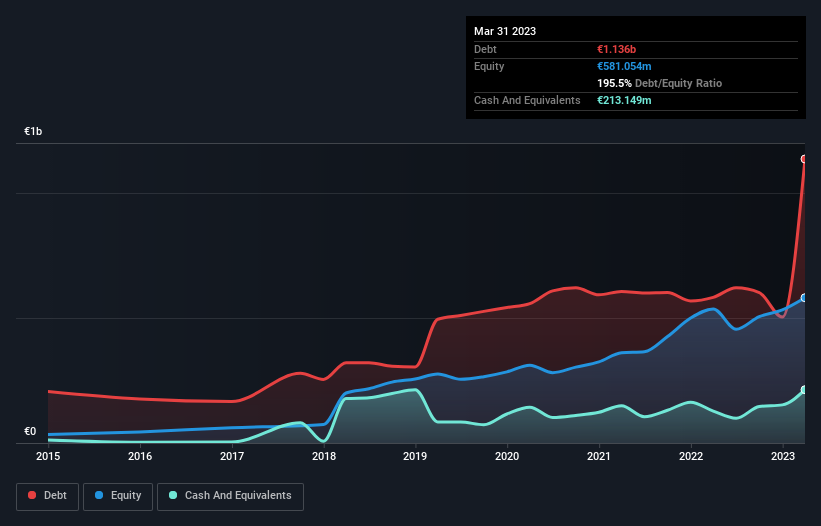Dermapharm Holding (ETR:DMP) Has A Pretty Healthy Balance Sheet
Some say volatility, rather than debt, is the best way to think about risk as an investor, but Warren Buffett famously said that 'Volatility is far from synonymous with risk.' So it might be obvious that you need to consider debt, when you think about how risky any given stock is, because too much debt can sink a company. Importantly, Dermapharm Holding SE (ETR:DMP) does carry debt. But should shareholders be worried about its use of debt?
When Is Debt Dangerous?
Debt assists a business until the business has trouble paying it off, either with new capital or with free cash flow. In the worst case scenario, a company can go bankrupt if it cannot pay its creditors. However, a more common (but still painful) scenario is that it has to raise new equity capital at a low price, thus permanently diluting shareholders. Of course, the upside of debt is that it often represents cheap capital, especially when it replaces dilution in a company with the ability to reinvest at high rates of return. The first step when considering a company's debt levels is to consider its cash and debt together.
See our latest analysis for Dermapharm Holding
What Is Dermapharm Holding's Debt?
As you can see below, at the end of March 2023, Dermapharm Holding had €1.14b of debt, up from €582.6m a year ago. Click the image for more detail. On the flip side, it has €213.1m in cash leading to net debt of about €923.0m.

A Look At Dermapharm Holding's Liabilities
According to the last reported balance sheet, Dermapharm Holding had liabilities of €294.4m due within 12 months, and liabilities of €1.29b due beyond 12 months. Offsetting this, it had €213.1m in cash and €108.5m in receivables that were due within 12 months. So it has liabilities totalling €1.27b more than its cash and near-term receivables, combined.
Dermapharm Holding has a market capitalization of €2.53b, so it could very likely raise cash to ameliorate its balance sheet, if the need arose. But it's clear that we should definitely closely examine whether it can manage its debt without dilution.
We use two main ratios to inform us about debt levels relative to earnings. The first is net debt divided by earnings before interest, tax, depreciation, and amortization (EBITDA), while the second is how many times its earnings before interest and tax (EBIT) covers its interest expense (or its interest cover, for short). Thus we consider debt relative to earnings both with and without depreciation and amortization expenses.
Dermapharm Holding has a debt to EBITDA ratio of 2.8, which signals significant debt, but is still pretty reasonable for most types of business. But its EBIT was about 12.7 times its interest expense, implying the company isn't really paying a high cost to maintain that level of debt. Even were the low cost to prove unsustainable, that is a good sign. Importantly Dermapharm Holding's EBIT was essentially flat over the last twelve months. Ideally it can diminish its debt load by kick-starting earnings growth. There's no doubt that we learn most about debt from the balance sheet. But ultimately the future profitability of the business will decide if Dermapharm Holding can strengthen its balance sheet over time. So if you want to see what the professionals think, you might find this free report on analyst profit forecasts to be interesting.
Finally, a company can only pay off debt with cold hard cash, not accounting profits. So we clearly need to look at whether that EBIT is leading to corresponding free cash flow. During the last three years, Dermapharm Holding produced sturdy free cash flow equating to 76% of its EBIT, about what we'd expect. This free cash flow puts the company in a good position to pay down debt, when appropriate.
Our View
Happily, Dermapharm Holding's impressive interest cover implies it has the upper hand on its debt. But truth be told we feel its net debt to EBITDA does undermine this impression a bit. Looking at all the aforementioned factors together, it strikes us that Dermapharm Holding can handle its debt fairly comfortably. On the plus side, this leverage can boost shareholder returns, but the potential downside is more risk of loss, so it's worth monitoring the balance sheet. When analysing debt levels, the balance sheet is the obvious place to start. But ultimately, every company can contain risks that exist outside of the balance sheet. To that end, you should be aware of the 3 warning signs we've spotted with Dermapharm Holding .
If, after all that, you're more interested in a fast growing company with a rock-solid balance sheet, then check out our list of net cash growth stocks without delay.
New: Manage All Your Stock Portfolios in One Place
We've created the ultimate portfolio companion for stock investors, and it's free.
• Connect an unlimited number of Portfolios and see your total in one currency
• Be alerted to new Warning Signs or Risks via email or mobile
• Track the Fair Value of your stocks
Have feedback on this article? Concerned about the content? Get in touch with us directly. Alternatively, email editorial-team (at) simplywallst.com.
This article by Simply Wall St is general in nature. We provide commentary based on historical data and analyst forecasts only using an unbiased methodology and our articles are not intended to be financial advice. It does not constitute a recommendation to buy or sell any stock, and does not take account of your objectives, or your financial situation. We aim to bring you long-term focused analysis driven by fundamental data. Note that our analysis may not factor in the latest price-sensitive company announcements or qualitative material. Simply Wall St has no position in any stocks mentioned.
About XTRA:DMP
Dermapharm Holding
Manufactures and sells off-patent branded pharmaceutical products in Germany, France, Spain, Austria, Switzerland, and internationally.
Good value with proven track record.
Market Insights
Community Narratives



